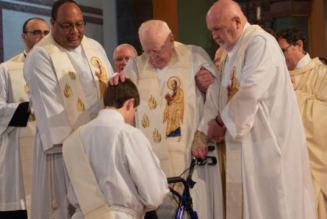, December 24, 2020

Walking into a Catholic Church should feel like walking into your mother’s living room, and walking into your mother’s living room should feel like entering a domestic church.
That is the ultimate meaning of Sunday’s celebration of The Holy Family of Jesus, Mary and Joseph.
In the Gospel, Mary, Joseph and Jesus experience what it is like to walk into the Temple and be greeted familiarly by strangers, just as, at Christmas, they experienced what it was like for strangers to gather around their child’s crib and feel at home.
Both these experiences come from putting Jesus at the center of life, in the family and out in the world.
The Gospel for Sunday points to the Old and New Covenants, both at once.
The story of the Presentation in the Temple depicts the return of God to his Temple, Bishop Robert Barron points out in his Word on Fire Bible, an event which the “old seer” Simeon, a stand-in for the Jewish people, has long awaited. But it is also depicts a deeply personal moment of a family fulfilling their religious duty, and facing just what having Jesus Christ in their lives will mean, after hearing Simeon’s warning that “you yourself a sword will pierce.”
The Jewish religion, and Christianity after it, treats the family differently from the pagan religions that predominated in the ancient world. Whereas pagan religions often kept women out of major religious services, here we see Mary welcomed in the Temple by another woman. Children belonged to their parents in pagan religions, who could discard them if they were unwanted, and if they kept them, tasked them with carrying on the religious rituals to their family gods. Jews believed children belonged to God and were only temporarily entrusted to the parents. For the Jews and for us, the one Almighty God grants providence, fruitfulness and purpose; tasks Romans attributed to their household gods.
The Presentation story shows how Jesus takes the Jewish conception of the family one step further. Mary and Joseph turn their whole lives over to God — they offer their chastity, their safety, their vocations, and their futures to the raising of this child. In return, God gives them his son. This is the same “humble exchange” he makes with us.
There are two possible sets of readings for this Sunday; both show how Jesus transforms family love.
Call one set of readings the “Abraham option.” If you follow these readings, you hear Abraham’s story in Genesis, celebrate his covenant in the Psalm, and then appreciate it in the light of Christ in a reading from Hebrews.
Abraham emerged from the idol worship of prehistory and with great faith threw himself into the hands of the one Almighty God. Abraham chose obedience to God over family, and was ready to present his son to God not ritually in a Temple but on a mountaintop altar. God spared Isaac and made Abraham the keeper of the covenant, promising him that his descendants would number as the stars, and then assuring us in the Psalm that “The Lord remembers his covenant for ever.”
Call the other option for readings the “family life option.” Sirach shares great advice on living in a family: Honor your parents (excessively; to the point of reverence) and care for them, especially in old age. The Psalm praises the simple joys of domestic life: Enjoying the fruits of your labors in a rich home life; seeking blessing in the Lord. Then St. Paul in the second reading opens that love out to the world.
We all know how family love works. We love family members just because they are family members. We don’t love them because we want something in return; we love them even when they are disobedient; we love them even when we don’t like them; we love them no matter what they look like or whether their tastes match ours or not. We accept family unconditionally and we feel unconditionally accepted by our family.
In the new covenant, Paul says Christians should treat everyone that way. The virtues he counsels were a revolution against the prevailing cruelty of paganism. As Pope Benedict XVI put it:
“In the writings of the Church Fathers, a lack of feeling — insensitivity toward the suffering of others — is considered typical of paganism. In contrast to this attitude, the Christian faith holds up the God who suffers with men, and thereby draws us into his ‘com-passion’ The Mater Dolorosa, the mother whose heart is pierced by a sword, is an iconic image of this fundamental attitude of Christian faith.”
Today the vigorous virtues of Christianity remain far from the weak virtues we have too often replaced them with today. Christianity offers “heartfelt compassion” in place of public safety; “kindness,” treating others as kin, in place of “being nice;” “humility” in place of individualism; “gentleness and patience” in place of political correctness and tactful silence.
The world would have us be tolerant and “live and let live.” The Gospel asks us to love.
These virtues start in the home, no matter what your family looks like.
The Gospel this Sunday is good news for you even if your family looks different from the norm. On the one hand, Sunday’s readings celebrate the Christian ideal of the family: two parents with many children — “like olive plants around your table,” to use the Psalm’s language. On the other hand, Sunday’s Gospel shows a group of people who don’t fit that mold at all: An only child; a young mother whose son was conceived by the Holy Spirit, not her husband; a foster father who is nonetheless a true father to his son; and Anna, a childless widow, to complete the picture.
As St. Ambrose put it, “Simeon had prophesied, a woman united in marriage had prophesied, a virgin had prophesied; it was meet also that a widow should prophesy, that there might lack no sex or condition of life.”
Whatever our family looks like, we all fall short of the ideal of family love. We all have family members we have failed to accept “just because they are family,” we all fail to bear with each other with patience and forgiveness. We shortchange our family when we put our career and selfish pursuits before them, and we shortchange God when we make decisions to please our family instead of him. We often reserve what’s best for ourselves, what’s second-best for our families, and then give God whatever we find easiest to part with.
On the feast of the Holy Family, however, those who sacrifice for God are generously repaid.
We all want to be better. In our favorite Christmas stories, generous self-giving love is repaid with the joys of family life, from Ebenezer Scrooge’s reconciliation with nephew Fred and the Cratchits to George Bailey’s reconciliation with Mary, Zuzu, Pete, Janie, Tommy, and Uncle Billy. We love these stories because we see ourselves in them, and see the future we long for.
Simeon gave the Temple his dutiful prayer and was repaid by seeing the face of God. Anna’s years of intimate encounter with God in the Temple were repaid with an intimate encounter with the Mother of God and her savior. Mary and Joseph’s sacrifice of two turtledoves and a lifetime were repaid with eternal life, and with honors on earth that continue two millennia later.
That is the future God wants for us too, and the future he prepares for us in the family we are born into and in the family we are baptized into, the Church.
Tags: Holy Family feast Year B, prayer, Sunday Gospel, Sunday Readings
Never miss a post! Subscribe below to our weekly newsletter.
Related
Join Our Telegram Group : Salvation & Prosperity









